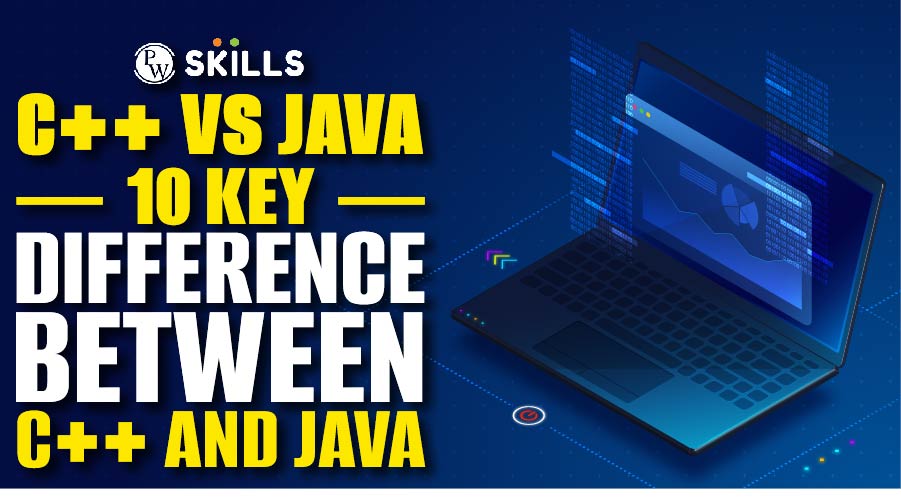Find all the differences between C++ and Java. Both programming languages are popular and extremely useful to advance your skills in programming!
Difference between C++ and Java: Programming languages are the backbone of almost all technological advancements we see in today’s world. From creating software and applications to powering websites, programming languages play a crucial role. Two popular choices among developers are C++ and Java – both widely used for different purposes but often compared due to their similarities.

While Java may be more beginner-friendly with its simpler syntax and garbage collection feature, C++ offers more flexibility and control over hardware resources.
However, if you want to dive into the world of competitive programming or delve deeper into data structures and algorithms, then the C++ with DSA course by Physics Wallah is undoubtedly the best way to go.
With a comprehensive syllabus taught by renowned instructors, this course will equip you with all the necessary skills to master C++ for competitive coding. Plus, by using the coupon code “READER”, you can avail an exclusive discount on this highly sought-after course.
Difference between C++ and Java in Tabular Form
C++ is platform-dependent, meaning code needs to be compiled separately for each platform. Java is platform-independent, allowing code to be run on any platform without recompilation. Below table highlights key distinctions between C++ and Java based on platform dependence, primary use, execution methods, and origins.
| Difference between C++ and Java | ||
| Feature/Aspect | C++ | Java |
| Origin | Developed by Bjarne Stroustrup in 1980s | Developed by Sun Microsystems in the 1990s |
| Compilation | Compiled language | Compiled to bytecode, then interpreted |
| Platform Dependency | Platform-dependent | Platform-independent (write once, run anywhere) |
| Memory Management | Manual (programmer-controlled) using pointers | Automatic garbage collection |
| Object-Oriented | Object-oriented | Purely Object-Oriented |
| Multiple Inheritance | Supports | Does not support |
| Exception Handling | Uses try, catch, and throw | Uses try, catch, and finally |
| Library Support | Standard Template Library (STL) | Java Standard Library (JSL) |
| Performance | Generally faster due to direct hardware access | Generally slower due to bytecode interpretation |
| Syntax Complexity | More complex | Generally simpler |
| Pointers | Supports pointers | No pointers, uses references |
| Threading | Supports multi-threading | Built-in support for multi-threading |
| Security | Less secure due to pointer manipulation | More secure due to bytecode verification |
Difference between C++ and Java With Examples
Here’s a comparison between C++ and Java, illustrated with examples for each difference:
1) Platform Dependency:
C++: Programs compiled in C++ are platform-dependent. If you compile a C++ program on Windows, it won’t run directly on Linux without recompilation.
#include <iostream>
int main() {
std::cout << “Hello, World!”;
return 0;
}
Java: Java programs are platform-independent. Once compiled to bytecode, a Java program can run on any machine with the Java Virtual Machine (JVM) installed.
public class HelloWorld {
public static void main(String[] args) {
System.out.println(“Hello, World!”);
}
}
2) Memory Management:
C++: Requires manual memory management using pointers. Developers must allocate and deallocate memory.
int* arr = new int[5];
delete[] arr; // Deallocate memory
Java: Uses automatic garbage collection, so developers don’t have to manage memory explicitly.
int[] arr = new int[5];
// No need to explicitly deallocate memory; garbage collector will handle it
3) Multiple Inheritance:
C++: Supports multiple inheritance, allowing a class to inherit from multiple classes.
class A { /* … */ };
class B { /* … */ };
class C : public A, public B { /* … */ };
Java: Doesn’t support multiple inheritance of classes to avoid complexities, but it allows multiple interface inheritance.
interface A { /* … */ }
interface B { /* … */ }
class C implements A, B { /* … */ }
4) Exception Handling:
C++: Uses try, catch, and throw for exception handling.
// C++ exception handling example
try {
throw std::runtime_error(“An error occurred!”);
} catch (const std::exception& e) {
std::cout << “Caught exception: ” << e.what() << std::endl;
}
Java: Also uses try, catch, and introduces finally for exception handling.
// Java exception handling example
try {
throw new RuntimeException(“An error occurred!”);
} catch (Exception e) {
System.out.println(“Caught exception: ” + e.getMessage());
} finally {
System.out.println(“This will always execute.”);
}
These examples highlight some of the key differences between C++ and Java in terms of platform dependency, memory management, inheritance, and exception handling.
Also Read: What is SQL (Structured Query Language)?
Difference Between C++ and Java Interview Questions
Here are some interview questions that specifically focus on distinguishing between C++ and Java:
1) Platform Dependency:
- Question: How does the platform dependency of C++ differ from Java?
- Answer: C++ produces native machine code specific to the platform it’s compiled on, while Java compiles to bytecode, which runs on any machine with a Java Virtual Machine (JVM).
2) Memory Management:
- Question: Describe the memory management differences between C++ and Java.
- Answer: C++ requires manual memory management using pointers and does not have built-in garbage collection. Java, on the other hand, uses automatic garbage collection, freeing developers from explicit memory management tasks.
3) Inheritance:
- Question: Can you discuss how inheritance works in both C++ and Java?
- Answer: While C++ supports multiple inheritance allowing a class to inherit from multiple classes, Java avoids the complexity by supporting only single inheritance of classes but permits multiple interface inheritance.
4) Exception Handling:
- Question: How do exception handling mechanisms differ between C++ and Java?
- Answer: Both languages use try, catch, and throw constructs. However, Java introduces the finally block for cleanup tasks, ensuring execution regardless of exceptions, which is not present in C++.
5) Runtime Environment:
- Question: What is the runtime environment for C++ compared to Java?
- Answer: C++ programs compile to machine-specific binaries and run directly on the operating system. Java programs, once compiled, run on the JVM, providing platform independence.
6) Performance vs. Portability:
- Question: How would you compare C++ and Java in terms of performance and portability?
- Answer: C++ often offers better performance due to direct hardware interaction, but Java provides greater portability across platforms due to its bytecode compilation.
7) Standard Libraries:
- Question: Discuss the standard libraries available in C++ and Java.
- Answer: C++ provides the Standard Template Library (STL) for various algorithms and data structures, while Java offers the Java Standard Library with built-in support for collections, utilities, and I/O operations.
8) Pointer Usage:
- Question: How do pointers function differently in C++ compared to Java?
- Answer: C++ supports direct memory manipulation through pointers, while Java uses references to objects but does not have explicit pointer arithmetic, ensuring safer memory management.
9) Language Philosophy:
- Question: Can you elaborate on the fundamental language philosophies behind C++ and Java?
- Answer: C++ emphasizes control and efficiency, providing low-level memory access and performance optimization. In contrast, Java prioritizes simplicity, readability, and platform independence, abstracting many system-level details.
10) Runtime vs. Compile-time Errors:
- Question: How are errors handled differently in C++ and Java regarding runtime and compile-time?
- Answer: C++ can have more compile-time errors due to its static nature, whereas Java catches many errors at compile-time but also incorporates a robust runtime environment for exceptions and errors.
These interview questions delve into various aspects that differentiate C++ and Java, from their foundational principles to practical application and performance considerations.
Also Read: Full Form of OOPS
Difference between C++ and Java for Beginners
Here’s a simplified comparison between C++ and Java tailored for beginners:
1) Basic Syntax:
- C++: Uses pointers extensively for memory management.
- Java: Does not support pointers; uses references instead.
2) Platform Dependency:
- C++: Code needs to be compiled separately for each platform.
- Java: Compiled to bytecode, runs on any system with a Java Virtual Machine (JVM), ensuring platform independence.
3) Memory Management:
- C++: Requires manual memory management using techniques like new and delete.
- Java: Utilizes automatic garbage collection, freeing developers from explicit memory management.
4) Object-Oriented Features:
- C++: Supports multiple inheritance, allowing a class to inherit from multiple classes.
- Java: Implements single-class inheritance but supports multiple interface inheritance using the implements keyword.
5) Exception Handling:
- C++: Uses try-catch blocks for exception handling but lacks a finally block.
- Java: Offers a more robust exception handling mechanism with try, catch, and finally blocks.
6) Standard Libraries:
- C++: Provides the Standard Template Library (STL) for algorithms, data structures, and other utilities.
- Java: Includes a comprehensive Java Standard Library with built-in support for collections, utilities, and I/O operations.
7) Performance vs. Portability:
- C++: Generally offers better performance due to direct hardware access.
- Java: Prioritizes portability; though slightly slower, it runs consistently across platforms.
8) Development Environment:
- C++: Requires separate compilers for different platforms and potentially different IDEs.
- Java: Provides a more unified development environment with tools like Eclipse or IntelliJ IDEA, simplifying cross-platform development.
9) Pointer Usage:
- C++: Allows direct memory manipulation using pointers, leading to potential risks like memory leaks.
- Java: Uses references to objects but avoids explicit pointer arithmetic, enhancing safety.
10) Community and Support:
- C++: Boasts a vast community and has been around longer, offering extensive resources and libraries.
- Java: Has a strong community and corporate backing, ensuring consistent updates, documentation, and support.
While C++ offers more control and performance optimization, Java emphasizes simplicity, safety, and platform independence. Beginners may find Java more accessible due to its robust standard libraries and simplified memory management, while C++ provides a deeper understanding of low-level programming concepts.
Also Read: What is Hypothesis Testing in Statistics? Types and Examples
Difference between C, C++ and Java
Here’s a concise comparison between C, C++, and Java:
1) Origin & History:
- C: Developed in the early 1970s by Dennis Ritchie at Bell Labs. It’s a procedural programming language.
- C++: Evolved from C in the early 1980s by Bjarne Stroustrup. It introduced object-oriented programming (OOP) features to C.
- Java: Created by James Gosling at Sun Microsystems in the mid-1990s. It was designed as an OOP language with a goal of “Write Once, Run Anywhere” (WORA) through its bytecode system.
2) Paradigm:
- C: Procedural programming.
- C++: Supports both procedural and object-oriented programming paradigms.
- Java: Primarily an object-oriented language, though it supports procedural programming as well.
3) Memory Management:
- C: Requires manual memory management using functions like malloc() and free().
- C++: Supports both manual memory management and automatic memory management using destructors and smart pointers.
- Java: Utilizes automatic garbage collection, freeing developers from explicit memory management.
4) Platform Dependency:
- C: Code must be recompiled for different platforms.
- C++: Similar to C, but with the added portability of object-oriented features.
- Java: Compiled to bytecode, executed on any system with a Java Virtual Machine (JVM), ensuring platform independence.
5) Standard Libraries:
- C: Standard Library offers basic functionalities like input/output and string manipulation.
- C++: Includes the Standard Template Library (STL) for algorithms, data structures, and utilities.
- Java: Provides a comprehensive Java Standard Library with built-in support for collections, utilities, and networking.
6) Error Handling:
- C: Uses error codes and errno for error handling.
- C++: Incorporates exception handling using try-catch blocks, enhancing error management.
- Java: Offers robust exception handling with try, catch, and finally blocks.
7) Object-Oriented Features:
- C: Does not support OOP inherently.
- C++: Introduces OOP features like classes, objects, inheritance, polymorphism, and encapsulation.
- Java: Primarily designed as an OOP language, providing strong support for classes, interfaces, inheritance, and polymorphism.
8) Community & Support:
- C: Has a vast community due to its longstanding presence, with extensive resources and libraries.
- C++: A strong community backs it, offering comprehensive resources, especially for application development and systems programming.
- Java: Supported by a large community and corporate entities, ensuring consistent updates, documentation, and support.

While C emphasizes simplicity and performance, C++ builds upon C by adding OOP features and more extensive libraries. Java, on the other hand, prioritizes portability and safety, with its bytecode execution model enabling cross-platform compatibility. Each language has its strengths, making them suitable for different application domains and development contexts.
Also Read: What is Encapsulation Explain in Details
When it comes to learning C++, the C++ with DSA Course by Physics Wallah stands out as an exceptional option. With its comprehensive curriculum covering data structures and algorithms along with practical implementation in C++, this course offers a well-rounded learning experience.
So why wait? Start your journey towards mastering C++ today by enrolling in the C++ with DSA Course by Physics Wallah. And as an added bonus, use the code “READER” at checkout to receive a special discount as a reader of this blog post.
Difference between C++ and Java FAQs
What is the main difference between C++ and Java?
C++ is a hybrid language supporting both procedural and object-oriented programming, while Java is primarily an object-oriented language. Java is platform-independent due to its bytecode execution on the Java Virtual Machine (JVM), whereas C++ is platform-dependent.
What is the difference between Java and OOP?
Java is a programming language, whereas OOP (Object-Oriented Programming) is a programming paradigm or methodology. Java incorporates OOP principles like encapsulation, inheritance, polymorphism, and abstraction within its language structure.
Do we need C++ for Java?
No, you do not need C++ for Java. While C++ served as an influence and foundation for Java, they are distinct languages. Knowing C++ is not a prerequisite for learning or using Java.
What is C++ used for in real life?
C++ is used in various real-life applications such as system software development, game development, embedded systems, high-performance applications, graphics engines, and more due to its efficiency, low-level memory access, and performance optimization capabilities.




